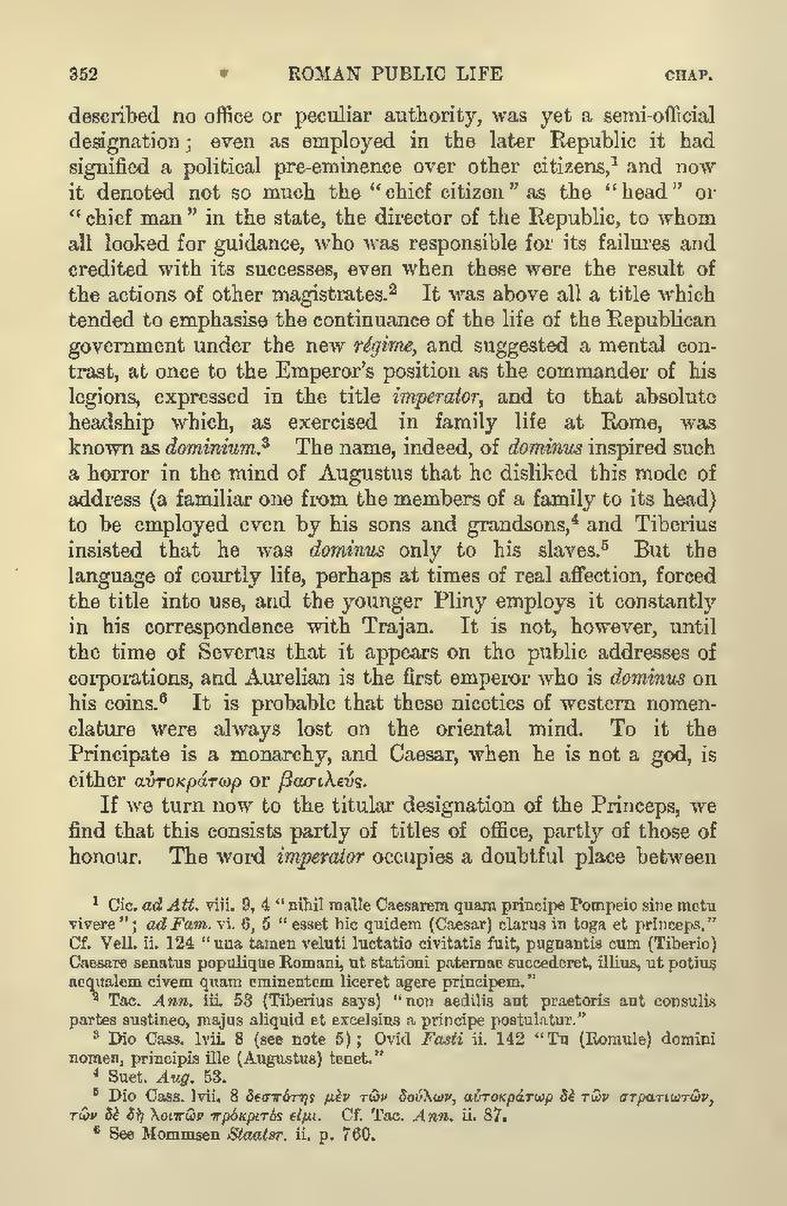described no office or peculiar authority, was yet a semi-official designation; even as employed in the later Republic it had signified a political pre-eminence over other citizens,[1] and now it denoted not so much the "chief citizen" as the "head" or "chief man" in the state, the director of the Republic, to whom all looked for guidance, who was responsible for its failures and credited with its successes, even when these were the result of the actions of other magistrates.[2] It was above all a title which tended to emphasise the continuance of the life of the Republican government under the new régime, and suggested a mental contrast, at once to the Emperor's position as the commander of his legions, expressed in the title imperator, and to that absolute headship which, as exercised in family life at Rome, was known as dominium.[3] The name, indeed, of dominus inspired such a horror in the mind of Augustus that he disliked this mode of address (a familiar one from the members of a family to its head) to be employed even by his sons and grandsons,[4] and Tiberius insisted that he was dominus only to his slaves.[5] But the language of courtly life, perhaps at times of real affection, forced the title into use, and the younger Pliny employs it constantly in his correspondence with Trajan. It is not, however, until the time of Severus that it appears on the public addresses of corporations, and Aurelian is the first emperor who is dominus on his coins.[6] It is probable that these niceties of western nomenclature were always lost on the oriental mind. To it the Principate is a monarchy, and Caesar, when he is not a god, is either [Greek: autokratôr] or [Greek: basileus].
If we turn now to the titular designation of the Princeps, we find that this consists partly of titles of office, partly of those of honour. The word imperator occupies a doubtful place between. Cf. Tac. Ann. ii. 87.]
- ↑ Cic. ad Att. viii. 9, 4 "nihil malle Caesarem quam principe Pompeio sine metu vivere"; ad Fam. vi. 6, 5 "esset hic quidem (Caesar) clarus in toga et princeps." Cf. Vell. ii. 124 "una tamen veluti luctatio civitatis fuit, pugnantis cum (Tiberio) Caesare senatus populique Romani, ut stationi paternae succederet, illius, ut potius aequalem civem quam eminentem liceret agere principem."
- ↑ Tac. Ann. iii. 53 (Tiberius says) "non aedilis aut praetoris aut consulis partes sustineo, majus aliquid et excelsius a principe postulatur."
- ↑ Dio Cass. lvii. 8 (see note 5); Ovid Fasti ii. 142 "Tu (Romule) domini nomen, principis ille (Augustus) tenet."
- ↑ Suet. Aug. 53.
- ↑ Dio Cass. lvii. 8 [Greek: despotês men tôn doulôn, autokratôr de tôn stratiôtôn, tôn de dê loipôn prokritos eimi
- ↑ See Mommsen Staatsr. ii. p. 760.
